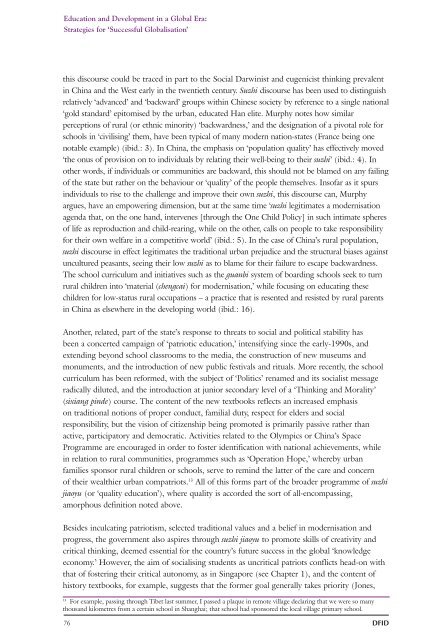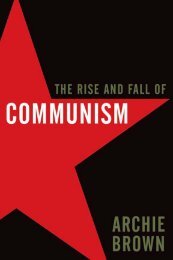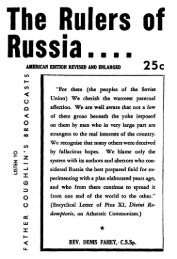education-dev-global-era-69
education-dev-global-era-69
education-dev-global-era-69
You also want an ePaper? Increase the reach of your titles
YUMPU automatically turns print PDFs into web optimized ePapers that Google loves.
Education and Development in a Global Era:Strategies for ‘Successful Globalisation’this discourse could be traced in part to the Social Darwinist and eugenicist thinking prevalentin China and the West early in the twentieth century. Suzhi discourse has been used to distinguishrelatively ‘advanced’ and ‘backward’ groups within Chinese society by reference to a single national‘gold standard’ epitomised by the urban, educated Han elite. Murphy notes how similarperceptions of rural (or ethnic minority) ‘backwardness,’ and the designation of a pivotal role forschools in ‘civilising’ them, have been typical of many modern nation-states (France being onenotable example) (ibid.: 3). In China, the emphasis on ‘population quality’ has effectively moved‘the onus of provision on to individuals by relating their well-being to their suzhi’ (ibid.: 4). Inother words, if individuals or communities are backward, this should not be blamed on any failingof the state but rather on the behaviour or ‘quality’ of the people themselves. Insofar as it spursindividuals to rise to the challenge and improve their own suzhi, this discourse can, Murphyargues, have an empowering dimension, but at the same time ‘suzhi legitimates a modernisationagenda that, on the one hand, intervenes [through the One Child Policy] in such intimate spheresof life as reproduction and child-rearing, while on the other, calls on people to take responsibilityfor their own welfare in a competitive world’ (ibid.: 5). In the case of China’s rural population,suzhi discourse in effect legitimates the traditional urban prejudice and the structural biases againstuncultured peasants, seeing their low suzhi as to blame for their failure to escape backwardness.The school curriculum and initiatives such as the guanbi system of boarding schools seek to turnrural children into ‘material (chengcai) for modernisation,’ while focusing on educating thesechildren for low-status rural occupations – a practice that is resented and resisted by rural parentsin China as elsewhere in the <strong>dev</strong>eloping world (ibid.: 16).Another, related, part of the state’s response to threats to social and political stability hasbeen a concerted campaign of ‘patriotic <strong>education</strong>,’ intensifying since the early-1990s, andextending beyond school classrooms to the media, the construction of new museums andmonuments, and the introduction of new public festivals and rituals. More recently, the schoolcurriculum has been reformed, with the subject of ‘Politics’ renamed and its socialist messag<strong>era</strong>dically diluted, and the introduction at junior secondary level of a ‘Thinking and Morality’(sixiang pinde) course. The content of the new textbooks reflects an increased emphasison traditional notions of proper conduct, familial duty, respect for elders and socialresponsibility, but the vision of citizenship being promoted is primarily passive rather thanactive, participatory and democratic. Activities related to the Olympics or China’s SpaceProgramme are encouraged in order to foster identification with national achievements, whilein relation to rural communities, programmes such as ‘Op<strong>era</strong>tion Hope,’ whereby urbanfamilies sponsor rural children or schools, serve to remind the latter of the care and concernof their wealthier urban compatriots. 13 All of this forms part of the broader programme of suzhijiaoyu (or ‘quality <strong>education</strong>’), where quality is accorded the sort of all-encompassing,amorphous definition noted above.Besides inculcating patriotism, selected traditional values and a belief in modernisation andprogress, the government also aspires through suzhi jiaoyu to promote skills of creativity andcritical thinking, deemed essential for the country’s future success in the <strong>global</strong> ‘knowledgeeconomy.’ However, the aim of socialising students as uncritical patriots conflicts head-on withthat of fostering their critical autonomy, as in Singapore (see Chapter 1), and the content ofhistory textbooks, for example, suggests that the former goal gen<strong>era</strong>lly takes priority (Jones,13For example, passing through Tibet last summer, I passed a plaque in remote village declaring that we were so manythousand kilometres from a certain school in Shanghai; that school had sponsored the local village primary school.76 DFID





